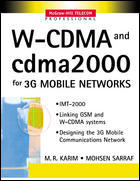Adaptive WCDMA
暫譯: 自適應 WCDMA
Savo G. Glisic
- 出版商: Wiley
- 出版日期: 2003-02-14
- 售價: $1,120
- 貴賓價: 9.8 折 $1,097
- 語言: 英文
- 頁數: 628
- 裝訂: Hardcover
- ISBN: 0470848251
- ISBN-13: 9780470848258
-
相關分類:
行動通訊 Mobile-communication
下單後立即進貨 (約5~7天)
買這商品的人也買了...
-
 資料結構-使用 C++ (Fundamentals of Data Structures in C++)
資料結構-使用 C++ (Fundamentals of Data Structures in C++)$520$260 -
 Visual C++ 6 教學手冊 (Beginning Visual C++ 6)
Visual C++ 6 教學手冊 (Beginning Visual C++ 6)$580$458 -
 計算機組織與設計--軟硬體界面第二版 (Computer Organization & Design, 2/e)
計算機組織與設計--軟硬體界面第二版 (Computer Organization & Design, 2/e)$680$537 -
 Pattern-Oriented Software Architecture Volume 2: Patterns for Concurrent and Networked Objects (Hardcover)
Pattern-Oriented Software Architecture Volume 2: Patterns for Concurrent and Networked Objects (Hardcover)$3,200$3,040 -
 Thinking in Java 中文版 (Thinking in Java, 2/e)
Thinking in Java 中文版 (Thinking in Java, 2/e)$920$726 -
 LPI Linux 資格檢定 (LPI Linux Certification in a Nutshell)
LPI Linux 資格檢定 (LPI Linux Certification in a Nutshell)$880$695 -
 演算法導論 (Introduction to Algorithms, 2/e)
演算法導論 (Introduction to Algorithms, 2/e)$860$430 -
 內嵌式 Linux 系統--硬體、軟體與介面 (Embedded Linux: Hardware, Software, and Int
內嵌式 Linux 系統--硬體、軟體與介面 (Embedded Linux: Hardware, Software, and Int$450$405 -
 生物資訊學電腦技術 (Developing Bioinformatics Computer Skills)
生物資訊學電腦技術 (Developing Bioinformatics Computer Skills)$780$616 -
 JavaScript 範例活用辭典
JavaScript 範例活用辭典$450$351 -
 Sun Certified Programmer & Developer for Java 2 Study Guide, 2/e
Sun Certified Programmer & Developer for Java 2 Study Guide, 2/e$1,840$1,748 -
 Web 好色-網頁色彩學
Web 好色-網頁色彩學$420$328 -
 作業系統概念 (Operating System Concepts, 6/e Windows XP Update)
作業系統概念 (Operating System Concepts, 6/e Windows XP Update)$780$741 -
 802.11 無線網路技術通論 (802.11 Wireless Networks: The Definitive Guide)
802.11 無線網路技術通論 (802.11 Wireless Networks: The Definitive Guide)$760$600 -
 Dreamweaver MX 互動網站百寶箱 for ASP
Dreamweaver MX 互動網站百寶箱 for ASP$580$493 -
 ASP.NET 程式設計徹底研究
ASP.NET 程式設計徹底研究$590$466 -
 Embedded Linux 嵌入式系統原理與實務
Embedded Linux 嵌入式系統原理與實務$860$731 -
 STRUTS 實作手冊(Struts in Action: Building Web Applications with the Leading Java Framework)
STRUTS 實作手冊(Struts in Action: Building Web Applications with the Leading Java Framework)$690$538 -
 作業系統
作業系統$650$618 -
 深入淺出 JBuilder 程式設計實作(JBuilder 9.0/8.0/7.0 適用) (Charlie Calvert's Learn Jbuilder)
深入淺出 JBuilder 程式設計實作(JBuilder 9.0/8.0/7.0 適用) (Charlie Calvert's Learn Jbuilder)$720$562 -
 物件導向系統分析與設計─使用 UML 與 JAVA
物件導向系統分析與設計─使用 UML 與 JAVA$280$252 -
 CMOS 電路模擬與設計─使用 Hspice
CMOS 電路模擬與設計─使用 Hspice$350$315 -
 鳥哥的 Linux 私房菜-伺服器架設篇
鳥哥的 Linux 私房菜-伺服器架設篇$750$638 -
 鳥哥的 Linux 私房菜─基礎學習篇增訂版
鳥哥的 Linux 私房菜─基礎學習篇增訂版$560$476 -
 人月神話:軟體專案管理之道 (20 週年紀念版)(The Mythical Man-Month: Essays on Software Engineering, Anniversary Edition, 2/e)
人月神話:軟體專案管理之道 (20 週年紀念版)(The Mythical Man-Month: Essays on Software Engineering, Anniversary Edition, 2/e)$480$379
相關主題
商品描述
WCDMA uses a wider radio band than CDMA, which was used for 2G systems, and
has a high transfer rate and increased system capacity and communication quality
by statistical multiplexing, etc. WCDMA efficiently utilises the radio spectrum
to provide a maximum data rate of 2 Mbit/s.
Third generation mobile
communication systems are scheduled for operational startup in Japan and Europe
in 2001-2002. Applying high-speed data transfer and state-of-the-art radio
terminal technology, third generations systems enable multimedia and are
currently in the process of being standardised under 3GPP. Among the three types
of system to be standardised (i.e. WCDMA, MC-CDMA, UTRA TDD), Japan and Europe
will adopt WCDMA in a strategy to take the lead through superior service.
This volume will cover the latest theoretical principles of WCDMA and explain why these principles are used in the standards. Starting with a general overview, the more advanced material is then gradually introduced providing an excellent roadmap for the reader.
- Presents comprehensive coverage of the theoretical and practical aspects of WCDMA
- Provides a detailed roadmap by presenting the material step-by-step for readers from differing backgrounds
- Systematically presents the latest results in the field
Ideal for Engineers, academics and postgraduate students involved in research and development, engineers involved in management and administration.
Table of Contents
Preface.
Fundamentals.
Pseudorandom Sequences.
Code Acquisition.
Code Tracking.
Modulation and Demodulation.
Power Control.
Interference Suppression and CDMA Overlay.
CDMA Network.
CDMA Network Design.
Resource Management and Access Control.
CDMA Packet Radio Networks.
Adaptive CDMA Networks.
Multiuser CDMA Receivers.
MMSE Multiuser Detectors.
Wideband CDMA Network Sensitivity.
Standards.
UMTS Standard: WCDMA/FDD Layer 1.
Index.
商品描述(中文翻譯)
CDMA(碼分多重存取)是一種用於無線通信的多重存取系統。其他多重存取方法包括 TDMA、FDMA 等。WCDMA(寬頻碼分多重存取)是第三代行動通信系統 UMTS(通用行動通信系統)所使用的主要空中介面,其特點是比 CDMA 擁有更寬的頻帶。
WCDMA 使用比 CDMA 更寬的無線頻帶,CDMA 用於 2G 系統,並透過統計多工等技術實現高傳輸速率、增加系統容量和通信質量。WCDMA 高效利用無線頻譜,提供最高 2 Mbit/s 的數據傳輸速率。第三代行動通信系統預定於 2001-2002 年在日本和歐洲啟用。透過應用高速數據傳輸和最先進的無線終端技術,第三代系統能夠支持多媒體,並目前正在 3GPP 下進行標準化。在將要標準化的三種類型系統中(即 WCDMA、MC-CDMA、UTRA TDD),日本和歐洲將採用 WCDMA,以透過優越的服務來領先。
本書將涵蓋 WCDMA 的最新理論原則,並解釋為何這些原則會在標準中使用。從一般概述開始,然後逐步引入更高級的材料,為讀者提供一個優秀的學習路線圖。
- 提供 WCDMA 理論和實踐方面的全面覆蓋
- 逐步呈現材料,為不同背景的讀者提供詳細的學習路線圖
- 系統性地展示該領域的最新成果
本書非常適合參與研究和開發的工程師、學者及研究生,以及從事管理和行政工作的工程師。
**目錄**
前言。
基本原理。
偽隨機序列。
碼獲取。
碼跟蹤。
調變與解調。
功率控制。
干擾抑制與 CDMA 疊加。
CDMA 網絡。
CDMA 網絡設計。
資源管理與存取控制。
CDMA 封包無線網絡。
自適應 CDMA 網絡。
多用戶 CDMA 接收器。
MMSE 多用戶檢測器。
寬頻 CDMA 網絡靈敏度。
標準。
UMTS 標準:WCDMA/FDD 第 1 層。
索引。











